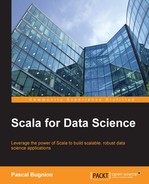In this chapter, we learned how to write a fully-featured web application with the Play framework. Congratulations on making it this far. Building web applications are likely to push many data scientists beyond their comfort zone, but knowing enough about the web to build basic applications will allow you to share your results in a compelling, engaging manner, as well as facilitate communications with software engineers and web developers.
This concludes our whistle stop tour of Scala libraries. Over the course of this book, we have learned how to tackle linear algebra and optimization problems efficiently using Breeze, how to insert and query data in SQL databases in a functional manner, and both how to interact with web APIs and how to create them. We have reviewed some of tools available to the data scientist for writing concurrent or parallel applications, from parallel collections and futures to Spark via Akka. We have seen how pervasive these constructs are in Scala libraries, from futures in the Play framework to Akka as the backbone of Spark. If you have read this far, pat yourself on the back.
This books gives you the briefest of introduction to the libraries it covers, hopefully just enough to give you a taste of what each tool is good for, what you could accomplish with it, and how it fits in the wider Scala ecosystem. If you decide to use any of these in your data science pipeline, you will need to read the documentation in more detail, or a more complete reference book. The references listed at the end of each chapter should provide a good starting point.
Both Scala and data science are evolving rapidly. Do not stay wedded to a particular toolkit or concept. Remain on top of current developments and, above all, remain pragmatic: find the right tool for the right job. Scala and the libraries discussed here will often be that tool, but not always: sometimes, a shell command or a short Python script will be more effective. Remember also that programming skills are but one aspect of the data scientist's body of knowledge. Even if you want to specialize in the engineering side of data science, learn about the problem domain and the mathematical underpinnings of machine learning.
Most importantly, if you have taken the time to read this book, it is likely that you view programming and data science as more than a day job. Coding in Scala can be satisfying and rewarding, so have fun and be awesome!
